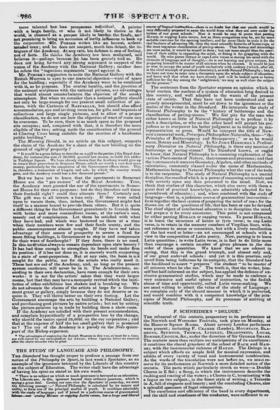THE STUDY OF LANGUAGE AND PHILOSOPHY.
THE Standard has thought proper to produce a passage from our notice of the Philosophy in Sport, in last week's Spectator, as an example of the ignorance betrayed by the. Liberals of this country on the subject of Education. The writer shall have the advantage of having his opinims stated in his own words.
" There is no subject on which so much ignorance is betrayed as on education. The Liberals are, in this, ignorant beyond their ordinary quantum, which is 'sayings great deal. Casting our eyes over the Spectator of yesterday, we meet the following passage Natural Philosophy is calculated by its nature and utility, to form one of the principal studies of youth. It combines admirably with tbe study of language; and if joined to a judicious course of grammatical Idiom—not arsing Horace or capping: Latin verses, but a large and liberal Icourse oftinguatinstructio is no doebt bet diet our youth would 'Ix very: differently prepared to ester tbe.world from what they are now under the tuitaou of our great schools.' Now it would be easy to prove that parsing Horace, or capping Latin verses, low as these occupations may be, are far mere suitable exercises for the opening intellect, and far more likely to train it for the real business of advancing life, than the most scientific histories of buttercups,' or the most ingenious- classification of paving-stones. That-botany-and mineralogy are most useful, it would be stupid to deny; but not more-stimuli than the asser- tion of their utility iu expanding the- mind, or fitting it for grappling with the world. Ile who parses Elorace or caps Latin verses is storing his mindiwith the elements of language and of thought,—he is not learning any: given science, but preparing himself to be master of all sciences when he chooses. It would bejiist as wise to occupy the mind of youth exclusively with cookery .(which, after all, is the chief triumph of practical chemistry), as with'Natural Philosophy ; NM as we have not time to: enter into a discussion upon the.whole subject of education, and know well that what, we have already said will be looked upon. as heresy sufficient for the, day among the , enlightened,' we may as well close the subject for the present."
The sentences from- the Spectator express an opinion which in brief contain the- nucleus of a system of education long desired in this country, and well adapted to the wants of the present state of society. That they have not been understood and are grossly misrepresented, must be set flown to the ignorance or the malice of the writer in the Standard. He interprets the study of Natural Philosophy to be the " history of buttercups and, the classification Of paving-stones." We feel pity for the man who either knows so little of Natural Philosophy as to profane it by such a description, or who on the other hand will permit his-pre- judices so to overpower his better judgment as to-indulge in mis- representation so gross. Would' he interpret the title of NEW- TON'S immortal work, PrincipiaPhilosophkeNaturalis, thus—" the Principles of Buttercuppery and Stonepavery; " or as he would mean, Botany and Mineralogy. In Sir JOHN HERSCHEL'S Prelimi- nary Discourse on Natural Philosophy, is there any mention of buttercup's or paving-stones? The Standard knows, or ought to know, that Natural Philosophy is a reasoning explanation of the various Phenomena of Nature, their causes and processes; and that the instruments it uses are Geometry, Algebra, and other methods of calculation, commonly classed under the name of' Mathematics, Mathematics being to Natural Philosophy what the use of the tools is to the carpenter. The study of Natural Philosophy is a mental discipline, the result of which is a power of reasoning accurately and with severity upon any data presented to the mind. Now, we think that studies of this'charanter, which also carry with them a great deal of practical knowledge, are admirably adapted for the groundwork of education ; and, when combined with the study of language—that is, a judicious course of grammatical instruction— form together the best system of preparing the mind of man for the discus.- ion of the questions of life, that has been or can be devised. The chief object of intellectual education is to discipline the mind, and prepare it for every encounter. This point is not- compassed by either parsing, HOR&CE or capping verses. To parse HORACE, is to learn the structure of heroic or lyric verse; to cap Latin • verse, is to retain in the memory numbers of Virgilian lines, with- out reference to sense or connexion, but with a lively recollection of the last word or letter—an art encouraged at schools with a view to the composition of Latin poetry. Now, parsing-is-to learn Latin quantities; to write Latin verse, is in fact to do little more than rearrange a certain number of given phrases- in ithe due order of these quantities. We know that we are cdrreet in saying, that this is. the. grand triumph, and almost only end, of our great endowed schools : and yet it is this practice, only saved from being ludicrous-by its antiquity, that the Standard has the hardihood to assert "prepares " the student " to be master of all sciences when he cho ses." The truth is, that the writer,. him- self but half-informed on the subject, has applied the defence of ex- clusive grammatical studies, which may be made to embrace _a very extensive and useful- sphere of instruction, to the foolish abuse of time and opportunity, called Latin verse-making. We are most willing to admit the value of the study, of Language : we complain only of the absurd manner in which it is perverted, and would combine with it a competent knowledge of the:prin- ciples of Natural Philosophy, and its processes of arriving at scientific truth.
















 Previous page
Previous page